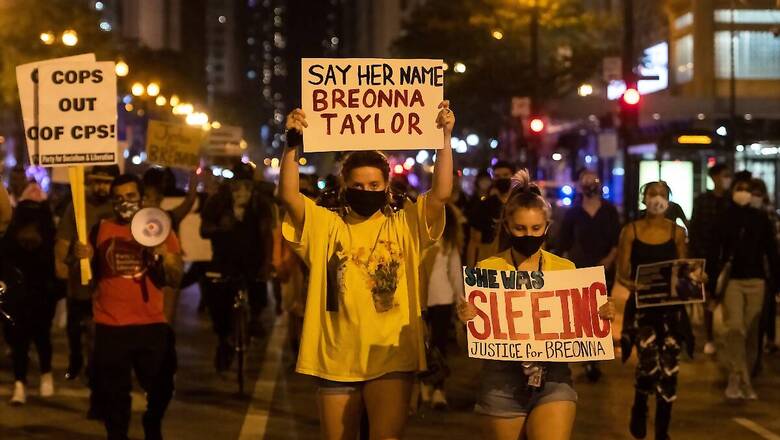
views
Since Breonna Taylor was awakened in the night and shot to death by police in her own home, Louisville, Kentucky, has banned no-knock warrants. A police chief was fired, and so was an officer who was on the scene. But despite demands from across the country, no one was charged in Taylor’s death.
On Wednesday, the Kentucky attorney general announced far less serious charges of wanton endangerment against one of the officers involved in the raid, and none against the two who shot Taylor six times.
The lack of a murder or manslaughter indictment was an outrage to many — but not a surprise. Few police officers are ever charged with murder or manslaughter when they cause a death in the line of duty, and only about a third of those officers are convicted.
Even as tens of thousands of Americans protest police brutality and demand overhauls of law enforcement, a yawning gulf remains between the public perception of police violence and how it is treated in court.
In the case against the Minneapolis officers charged with killing George Floyd, whose videotaped death in May shocked the nation and was almost universally denounced, the prosecutor, Attorney General Keith Ellison, has warned of the difficulty of prosecuting officers.
“Trying this case will not be an easy thing. Winning a conviction will be hard,” Ellison said in June, even as he announced that he was raising the charge against one of the officers, Derek Chauvin, to second-degree murder. “History does show that there are clear challenges here.”
Union protections that shield police officers from timely investigation, legal standards that give them the benefit of the doubt, and a tendency to take officers at their word have added up to few convictions and little prison time for officers who kill. On top of that, misconduct and poor judgment do not always amount to criminality.
Though state statutes vary, officers are generally permitted to use deadly force if they reasonably perceive imminent danger — a standard that has been criticized as overly subjective and prone to racial bias.
“Police know what to say and what to tell a jury and what to tell a judge to make those folks believe that they were reasonably in fear,” said Kate Levine, a professor at the Benjamin N. Cardozo School of Law in New York. “Even if there are other witnesses, those witnesses just don’t get the same amount of credibility determination from prosecutors, judges, juries.”
Law enforcement officers kill about 1,000 people a year across the United States. Since the beginning of 2005, 121 officers have been arrested on charges of murder or manslaughter in on-duty killings, according to data compiled by Philip M. Stinson, a criminal justice professor at Bowling Green State University in Ohio. Of the 95 officers whose cases have concluded, 44 were convicted, but often of a lesser charge, he said.
Convictions include cases like the killing of Laquan McDonald in Chicago, for which Jason Van Dyke was sentenced to nearly seven years in prison, and the killing of Justine Damond in Minneapolis, for which Mohamed Noor was sentenced to 12.5 years.
Many officers who avoided criminal convictions have been fired, like three of the other officers in the McDonald case, and Daniel Pantaleo, who used a chokehold on Eric Garner on Staten Island, New York.
More recently, officers involved in the deaths of Floyd in Minneapolis and Rayshard Brooks in Atlanta have been swiftly indicted on murder charges. Brooks’ case in particular appears to reflect changing standards; because he grabbed and fired an officer’s Taser before he was killed, several experts said they doubted charges would have been brought had the death occurred before the wave of protests and police scrutiny that followed Floyd’s death.
But two cases do not prove that prosecutors have grown more willing — or have yielded to increased pressure — to hold officers criminally accountable. Stinson said any such uptick is so far statistically insignificant. And several equally high-profile investigations of police killings have resulted in no indictment.
The death of Michael Brown in Ferguson, Missouri, in 2014 illustrates the disconnect between public views and prosecutorial reality: After nationwide protests over his death and a federal review of the case, the officer, Darren Wilson, was not indicted.
In July, Wesley Bell, the prosecutor elected after Brown’s death, ruefully announced that after yet another review he would not seek charges, though he added that his decision did not “exonerate” Wilson.
“The question of whether we can prove a case at trial is different than clearing him of any and all wrongdoing,” he said.
This week the prosecutor’s office in Tucson, Arizona, came to a similar conclusion in the death of Carlos Ingram Lopez, citing “insufficient evidence of a crime,” despite what the police chief had called violations of policy. Lopez died in police custody while naked, handcuffed and face down.
With increasing calls for change, a few states have attempted to make it easier to hold officers accountable.
In Washington state last month, an officer was charged with murder under a 2019 law that eliminated a requirement that prosecutors prove that an officer acted with “malice.” After the death of Stephon Clark in his grandmother’s backyard in Sacramento resulted in no criminal charges against officers, California tightened its use-of-force standard from reasonable to necessary.
But situations in which the police were facing an armed individual are always difficult to prosecute.
In a case like Taylor’s, for example, the fact that her boyfriend, Kenneth Walker, fired at the police first mattered more — under criminal law — than any flawed decisions or shoddy police work that led to the officers breaking down her door in the first place.
“I do understand why people are surprised, because the circumstances that led to Ms. Taylor’s death were preventable and unacceptable in terms of how the police treated her and Mr. Walker that night,” said Taryn Merkl, senior counsel at the Brennan Center for Justice and a former federal prosecutor.
In recent months, some advocates of criminal justice reform have argued that prosecuting officers may even be counterproductive because it avoids addressing systemic problems and, in the words of Levine, allows “the mainstream, white public, and the politicians who represent them to rest easy believing that problem police officers have gotten their due.”
These advocates point out an inherent contradiction between wanting to end over-incarceration and wanting to send police officers — including police officers of color, like Noor — to prison.
“To the extent that the public sees these prosecutions as a neat reckoning against white police officers on behalf of people of color, it is just not that simple,” Levine wrote.
Last month, Essence magazine published an op-ed by two Black prison abolitionists headlined, “We Want More Justice for Breonna Taylor Than The System That Killed Her Can Deliver.” The authors, Mariame Kaba and Andrea J. Ritchie, did not say that the officers should not be prosecuted, but that “collective responses rooted in arrests and prosecution are likely to lead to dead ends and deep disappointments.”
Shaila Dewan c.2020 The New York Times Company



















Comments
0 comment